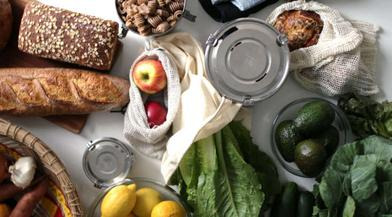Don't wanna be here? Send us removal request.
Text
Zero-Waste Kitchen Diaries
The idea behind Zero-Waste Kitchen Diaries is to reduce food waste, increase sustainability, and improve the green habits inside the kitchen. The book is meant for those who wish to help the environment by cooking at home, dining sustainably, and making convenient meal choices. In the following, I will explain ten important points that matter in this trend.
1. We make sure to cook every ingredient we have on hand: Cooking with no waste asks chefs to make use of broccoli stems, beet greens, citrus peels, and herb stems. Instead of throwing them away, people discover that you can make flavorful and healthy dishes from these small parts, including soups, sauces, stir-fries, and oils.
2. Creative Leftovers: Excess food is recycled, as it’s made into different meals. Chicken already cooked for Sunday lunch turns into delicious soup, and leftover rice is fried for a different dish. It allows you to save food and at the same time, enjoy different types of meals.
3. Home Composting: You should compost things like eggshells, coffee grounds, tea bags, and fruit pits because they cannot be avoided in the kitchen. Putting organic waste in a small bin indoors or a compost pile outside turns it into beneficial soil for growing gardens or plants.

4. Make Essentials in Your Pantry: Commonly, a zero-waste kitchen includes items like self-made nut butter, broth from vegetables that were not used all at once, and sauces created from extra ripe produce. These allow you to make your own packaged foods, which lasts them longer.
5. Good Practices for Going to the Store: Making a list and shopping according to it will stop you from buying more food than necessary. When you get your produce loose and dry foods in bulk, you lower waste from packaging. Also, buying less cuts down on anything that might spoil and waste your money.
6. Sustainable Storage: You can wrap food using beeswax wraps, put it in glass containers, use silicone lids, and choose cloth produce bags instead. They save food better than plastic bags and support those who want to live plastic-free.
7. You can make a lot of food at once and store it for later by ‘batch cooking’ and ‘meal planning: Having a larger quantity of meals means you won’t have so much waste when using ingredients. In addition, it cuts down on wasted food, allows you to handle your time better, and helps you watch your portion sizes.

8. Checking your Fridge & Pantry: Checking the contents of the fridge means you won’t buy unnecessary items, use what you have first, and notice what may need to be used quickly.
9. Educational Content: It usually involves providing facts about food wastage, sharing ways to be eco-friendly, and giving useful tips. It makes more people mindful and interested in changing what they eat at home.
10. Community Engagement Through Zero-Waste Kitchen Diaries, people network, post about their experiences in the kitchen, and spur others to take part in this movement.
2 notes
·
View notes